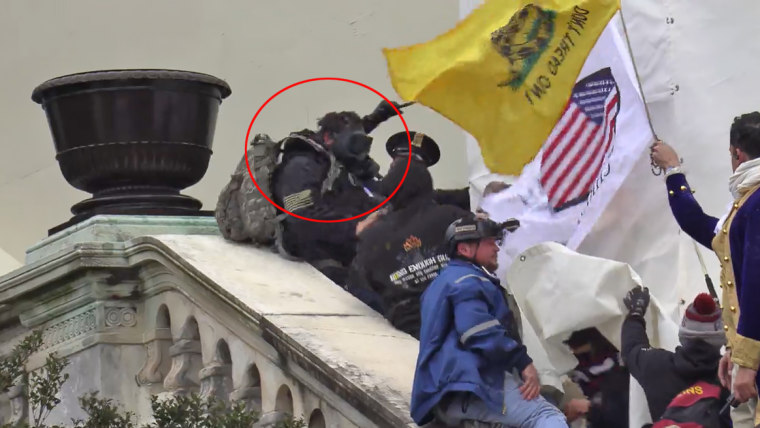WASHINGTON — A Jan. 6 defendant admitted on the stand Monday that he was armed with a gun when he charged toward a police line at the Capitol.
Christopher Alberts, of Maryland, was arrested with a gun near the Capitol on the night of Jan. 6 and was one of just a handful of rioters to be taken into custody that day. He faces a host of charges, including felony civil disorder and felony assaulting, resisting or impeding certain officers. Prosecutors allege that Alberts was “prepared for battle” on Jan. 6, wearing a tactical vest with protective plates and carrying a fully loaded firearm with hollow-point ammunition when he “brandished a wooden pallet-type object and used it as a makeshift battering ram."
Alberts said in court that “instinct took over” when he used the wooden pallet to “build a wall” between police and the mob while wearing a gas mask and the tactical vest. He also testified that he regularly wore a tactical vest and carried his sidearm when he worked as a tow truck driver. The vest helped him absorb the blows from less-lethal munitions used by the police, but he was struck in the arms as well as in the groin area, Alberts said.
He said that another rioter armed with a gun — Guy Reffitt — was simply "making his voice heard" on the steps of the Capitol on Jan. 6, and that he had a duty to protect Reffitt, who had charged up the stairs and toward the police line and waved other rioters forward. (Alberts did not know Reffitt and there's no evidence that he knew that Reffitt was also armed with a gun.) Reffitt was sentenced to more than seven years in federal prison in August 2022.
Alberts, like millions of Donald Trump supporters, believed the then-president's false claims about the 2020 election. “I felt like it was a fraudulent election” and there were questions that needed to be answered, Alberts testified.
The trial is ongoing, with the government expected to cross-examine Alberts on Monday afternoon. Closing arguments are expected early this week.
Before he charged at the police line, evidence showed, Alberts assisted in keeping a pathway clear so that officials could get another Jan. 6 rioter who needed medical assistance to safety.
During his direct testimony on Monday, Alberts insisted that police had used too much force against rioters who charged past police barriers and ultimately stormed the Capitol building. “Somebody had to put a stop to it,” he said. “It was wrong.”
Alberts also claimed that his actions were not "offensive" but rather "defensive."
Alberts said he believed that he had the right to protest on grounds of the U.S. Capitol and saw no indications that the grounds were restricted. He claimed the crowds he saw were "completely peaceful," though he acknowledged he pulled away another Jan. 6 rioter who was aggressively confronting an officer. He described the mob as "a couple thousand patriots on the lawn."
He also said an officer had a hand on their gun and said he "feared that he was about to be shot." Nevertheless, he continued on toward the Capitol and was at the front of the mob as they ran up the stairs towards the Capitol, where rioters soon breached the Senate wing.
"We were being silenced right here," Alberts said, speaking about an image of a mob or rioters overtaking the scaffolding that had been set up for Joe Biden's inauguration.
John Pierce, a pro-Trump attorney representing a huge number of Jan. 6 defendants, questioned Alberts on the stand. Alberts and his team had wanted to advance several affirmative defenses for his charged conduct, including arguing that Alberts had a right to bring a gun into D.C. because of the Second Amendment, but Judge Christopher R. Cooper rejected a number of those defenses.
About 1,000 people have been charged in connection with the Jan. 6 attack on the U.S. Capitol, and hundreds more cases are in the pipeline.

